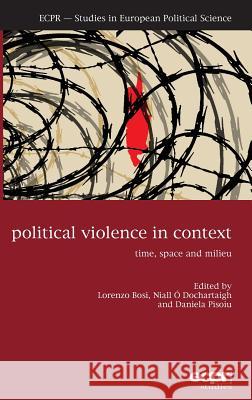Political Violence in Context: Time, Space and Milieu » książka
Political Violence in Context: Time, Space and Milieu
ISBN-13: 9781785521447 / Angielski / Twarda / 2016 / 324 str.
Political Violence in Context: Time, Space and Milieu
ISBN-13: 9781785521447 / Angielski / Twarda / 2016 / 324 str.
(netto: 443,82 VAT: 5%)
Najniższa cena z 30 dni: 469,93
ok. 16-18 dni roboczych.
Darmowa dostawa!
While much of the work in this field focuses on individual psychology or radical ideology, Bosi, O Dochartaigh, Pisoiu and others take a fresh, innovative look at the importance of context in generating mobilisation and shaping patterns of violence. The cases dealt with range widely across space and time, from Asia, Africa and Europe to the Americas, and from the Irish rebellion of 1916 through the Marxist insurgency of Sendero Luminoso to the 'Invisible Commando' of Cote d'Ivoire. They encompass a wide range of types of violence, from separatist guerrillas through Marxist insurgents and Islamist militants to nationalist insurrectionists and the distinctive forms of urban violence that have emerged at the boundary between crime and politics. Chapters offer new theoretical perspectives on the decisive importance of the spatial and temporal contexts, and supportive milieux, in which parties to conflict are embedded, and from which they draw strength.
Context is crucial to understanding the causes of political violence and the form it takes. This book examines how time, space and supportive milieux decisively shape the pattern and pace of political violence. While much of the work on political violence focuses on individual psychology or radical ideology, this book takes a fresh and innovative look at the importance of context in generating mobilisation and shaping patterns of violence. The cases dealt with in the book range widely across space and time, from Asia, Africa, and Europe to the Americas, and from the Irish rebellion of 1916 through the Marxist insurgency of Sendero Luminoso to the Invisible Commando of Cote DIvoire. They encompass a wide range of types of violence, from separatist guerrillas through Marxist insurgents and Islamist militants to nationalist insurrectionists and the distinctive forms of urban violence that have emerged at the boundary between crime and politics. The book offers new theoretical perspectives on the decisive importance of the spatial and temporal contexts and supportive milieux in which parties to conflict are embedded, and from which they draw strength.











